Indonesian Coffee beans | Sulawesi Island | Toraja Tonaga
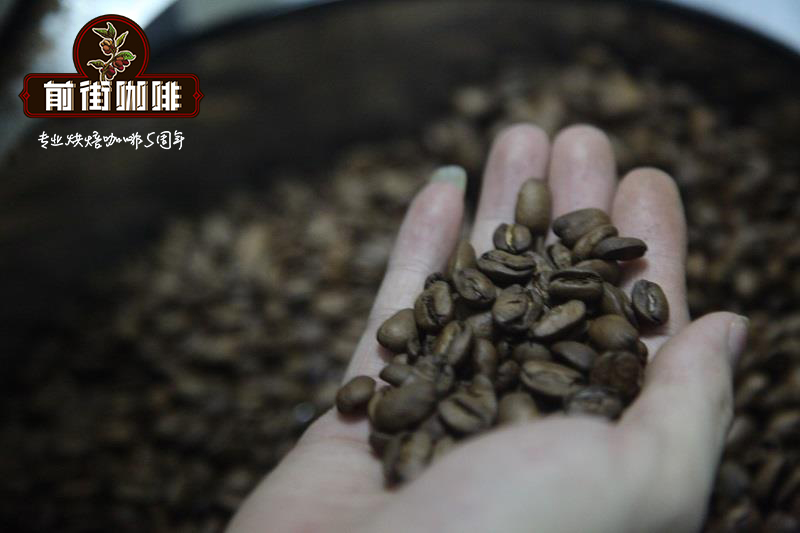
Professional coffee knowledge exchange more coffee bean information please follow the coffee workshop (Wechat official account cafe_style)
Qianjie Coffee Indonesia Coffee Bean | Golden Manning | Aceh Manning Tiger
Sulawesi Sulawesi is also one of the famous coffee-rich islands in Indonesia, with unique natural conditions, and it has a long history of growing coffee, especially the unique softness of Toraja Tonaga coffee, which has been gradually accepted and loved by countries around the world in recent years.

But because Toraja Tonaga doesn't produce much coffee, it has been defined as a boutique bean since Dutch times.
Compared with Sumandala, farmers in Toraja Tonaga have a good sense of quality and will pick ripe coffee and cherries for harvest, so the harvest season will be longer.
Toraja coffee in Sulawesi is also processed by Giling Basah, coupled with the rich iron ore in Sulawesi and high iron content in the soil, which create this unique flavor of Toraja coffee.
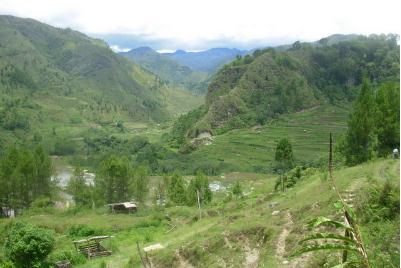
PS. (Giling: mill; Basah wet)
In recent years, some traders began to import Toraja coffee to Taiwan, and gradually Toraja Coffee Tonaga coffee began to become well-known in the market.
However, most of the knowledge about Toraja is limited to the words Toraja Kalosi Celebes, which makes some stores who use raw beans of Toraja coffee often confused about the definition of price and quality.
Did you buy Toraja, Kalosi, Toraja Kalosi or Celebes?
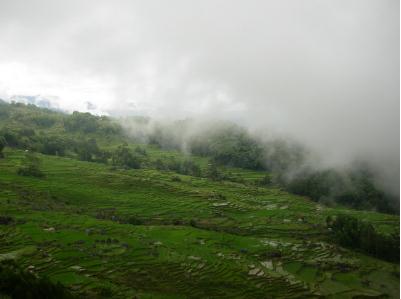
Here is only a simple explanation: in the past, everyone would commonly known as Toraja Kalosi (Tonagaro). That is because in the past, Toraja Tonaga coffee was harvested by farmers and sold to local middlemen, who then sent it to coffee factories in the so-called Kalosi area for processing, so Toraja coffee is often associated with Kalosi. In fact, Kalosi is mainly a distribution center for raw coffee beans, rather than famous for growing coffee.
So it is almost impossible to know whether the commonly bought Toraja Tonaga beans were harvested from that high-altitude coffee mountain area.
In the Toraja area, except for the 50-hectare planting jointly planted by the Forestry Bureau and Toarco Jaya in 2009, most of them are grown by small farmers and then bought by disk dealers, and the so-called large manor model has not been developed.
In recent years, the popularity of Toraja coffee has increased greatly, and the production is very small, so some raw bean buyers go straight to the mountains of Toraja to buy coffee beans directly, and slowly Toraja begins to have its own name.
A young man from Taiwan, after months of data collection and testing in the Toraja mountains, finally decided to choose the Toraja-Sapan mountain area in the middle of Sulawesi to buy coffee beans.
The coffee forest area of Sapan is 1300m above sea level and 1500m above sea level, which is also the most suitable environment for the growth of high-quality Arabica bean coffee forests in Indonesia, with an annual average temperature of about 28-22 degrees.
This place has the best soil quality, the thickness of more than 30 cm layer of rot, the whole is black soil, the coffee here can not only have enough nutrients to grow to large, but also the flavor is excellent!
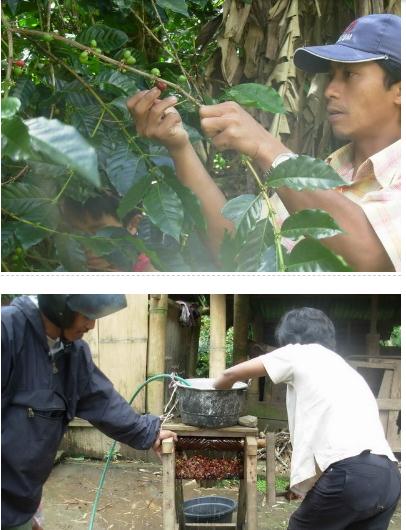
And unlike Toraja Tonaga sold by other traders, we have been in control since coffee farmers harvested cherry fruits and worked with farmers on a semi-contractual basis to harvest absolutely ripe cherries.
In general, the process of handling coffee in the Toraja mountain area is quite primitive. After removing the pulp, the pulp is simply washed, and the immature or diseased coffee beans are removed and then directly exposed to the sun for 2 to 3 days.
However, there is very little sunshine in the mountains, so most of them are simply dried and bagged for the trader to buy, so most of the Tonaga coffee beans (with shells) commonly seen in the market are extremely damp, and coffee beans are often moldy.
In order to avoid this kind of situation, after removing the coffee shell, we immediately pack the bag and send it directly to the sheepskin factory in Rantepao for two to three days before removing the sheepskin, and then send it to Makassar for sun exposure (because the sun temperature in Makassar is very high) and hand-picked grading.
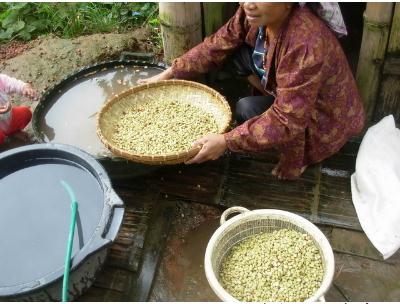
Producing area: Sulawesi-Sapan Mountain area
Characteristics: the appearance color is not easy to darken when baking.
Species: non-Jember species
Harvest time: July 2010
Here are some customs and knowledge sharing of Toraja
The local ethnic groups of Toraja are very different from the similar counties and districts, and they are unique Toraja ethnic groups. The cultural uniqueness of the Toraja is as follows:
1. Architecture: unique Tongolan because locals believe that their ancestors came here by boat because they believed that they were from heaven.
So in order to commemorate or return to the place where our ancestors lived in the future, the house was built into a boat-shaped roof.
2. Funerals: Toraja is not buried.
A. people with status (not with money) can get close to heaven, so they can dig holes in the rock face and make hanging coffins.
After the death of a person with status, the local people will carve his image in wood and put it outside his coffin as a memorial.
B. Ordinary people: they will build a graveyard in their own fields, shaped like an ordinary house, but without windows.
C. Children: if they die before the age of one, according to tradition, the child will be tied to a sacred tree so that the child can follow the tree and return to heaven.
D. No money for burial: they will first be placed in the room where they used to live at home, and will not be buried until they have money.
E. Funeral: it costs more than getting married. At funerals, cattle must be killed, because cattle are regarded locally as guardians.
They must ask the Protector to escort the dead back to heaven.
F. Toraja most of the cattle are buffaloes, and the number of local yellow cattle is very small. Cattle are not the main meat to eat locally, but sacrificial offerings.
So the average buffalo is about 25 (about 80,000), if there are white spots on the head.
There are 70 takeoffs (about NT $200,000), and the whole head is white, that is, 200 takeoffs (about NT $600,000).
Trust me, you read this number correctly.
This is why, in general, if someone in a family dies, they often have to wait three or five years before they can hold funerals for the deceased.
G. Funeral record: in 2005, the then county magistrate's mother-in-law died and the county magistrate took over the local stadium.
The funerals were held for seven consecutive days. It is said that a total of 500 pigs and 500 cattle were killed.
The total cost is more than 5 billion Indonesian dollars (please calculate by yourself, I am not good at math, divided by the exchange rate 300).
But KPK had no control over sulawesi at the time, so he got out of it.
3. Similar harvest festival: after the last rice harvest in December every year, local activities like harvest festival will be held.
Thank God for his care over the past year. There will be a bullfight at the harvest festival, but it is a "buffalo".
Qianjie coffee: Guangzhou bakery, the store is small but a variety of beans, you can find a variety of unknown beans, but also provide online store services. Https://shop104210103.taobao.com
Important Notice :
前街咖啡 FrontStreet Coffee has moved to new addredd:
FrontStreet Coffee Address: 315,Donghua East Road,GuangZhou
Tel:020 38364473
- Prev
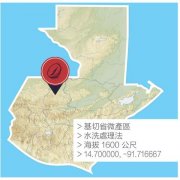
Guatemala COE Coffee beans | Pearl Pella Manor | Kaddura species | washing method
Professional coffee knowledge exchange more coffee bean information please follow the coffee workshop (Wechat official account cafe_style) Front Street Coffee Guatemala | Polsa Manor Pacamara Manor: Pearl Pella Manor Finca La Perla Award record: 2006 Guatemala COE fourth production area: Kirche Province Micro-production area (El Quiche) planting altitude: 1200m-1400m processing
- Next
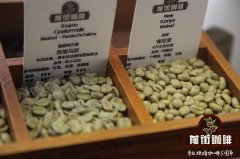
Guatemalan Coffee beans | San Marco Volcano producing area | Vescaya Manor Red Kaduai, Bourbon
Professional coffee knowledge exchange more coffee bean information please follow the coffee workshop (Wechat official account cafe_style) front street coffee Guatemalan Coffee | Polsa Pacamara | Rosa 2018 Panamanian Emerald Manor Red Standard Sun | Blue label Water washing | Green label Sun Manor introduction Vescaya Coffee Manor is located in the earliest production area in Guatemala.
Related
- Does Rose Summer choose Blue, Green or Red? Detailed explanation of Rose Summer Coffee plots and Classification in Panamanian Jade Manor
- What is the difference between the origin, producing area, processing plant, cooperative and manor of coffee beans?
- How fine does the espresso powder fit? how to grind the espresso?
- Sca coffee roasting degree color card coffee roasting degree 8 roasting color values what do you mean?
- The practice of lattes: how to make lattes at home
- Introduction to Indonesian Fine Coffee beans-- Java Coffee producing area of Indonesian Arabica Coffee
- How much will the flavor of light and medium roasted rose summer be expressed? What baking level is rose summer suitable for?
- Introduction to the characteristics of washing, sun-drying or wet-planing coffee commonly used in Mantenin, Indonesia
- Price characteristics of Arabica Coffee Bean Starbucks introduction to Manning Coffee Bean Taste producing area Variety Manor
- What is the authentic Yega flavor? What are the flavor characteristics of the really excellent Yejasuffi coffee beans?

